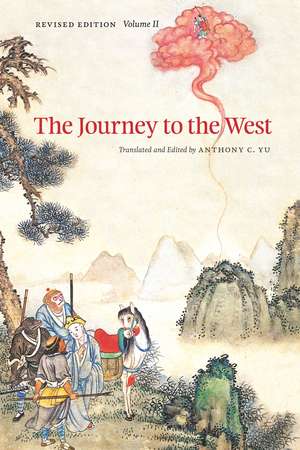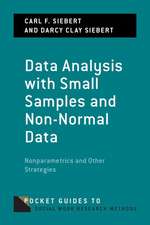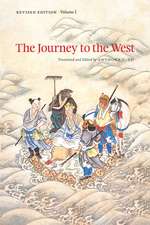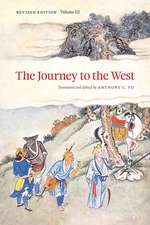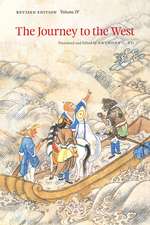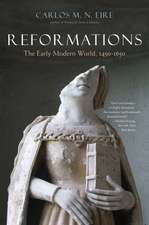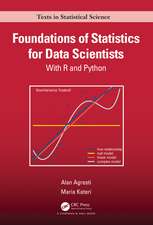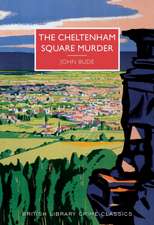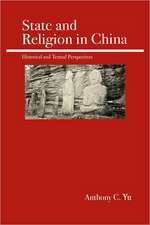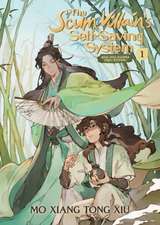The Journey to the West, Revised Edition, Volume 2
Traducere de Anthony C. Yuen Limba Engleză Paperback – 11 dec 2012
Anthony
C.
Yu’s
translation
ofThe
Journey
to
the
West,initially
published
in
1983,
introduced
English-speaking
audiences
to
the
classic
Chinese
novel
in
its
entirety
for
the
first
time.
Written
in
the
sixteenth
century,The
Journey
to
the
Westtells
the
story
of
the
fourteen-year
pilgrimage
of
the
monk
Xuanzang,
one
of
China’s
most
famous
religious
heroes,
and
his
three
supernatural
disciples,
in
search
of
Buddhist
scriptures.
Throughout
his
journey,
Xuanzang
fights
demons
who
wish
to
eat
him,
communes
with
spirits,
and
traverses
a
land
riddled
with
a
multitude
of
obstacles,
both
real
and
fantastical.
An
adventure
rich
with
danger
and
excitement,
this
seminal
work
of
the
Chinese
literary
canonis
by
turns
allegory,
satire,
and
fantasy.
With over a hundred chapters written in both prose and poetry,The Journey to the Westhas always been a complicated and difficult text to render in English while preserving the lyricism of its language and the content of its plot. But Yu has successfully taken on the task, and in this new edition he has made his translations even more accurate and accessible. The explanatory notes are updated and augmented, and Yu has added new material to his introduction, based on his original research as well as on the newest literary criticism and scholarship on Chinese religious traditions. He has also modernized the transliterations included in each volume, using the now-standard Hanyu Pinyin romanization system. Perhaps most important, Yu has made changes to the translation itself in order to make it as precise as possible.
One of the great works of Chinese literature,The Journey to the Westis not only invaluable to scholars of Eastern religion and literature, but, in Yu’s elegant rendering, also a delight for any reader.
With over a hundred chapters written in both prose and poetry,The Journey to the Westhas always been a complicated and difficult text to render in English while preserving the lyricism of its language and the content of its plot. But Yu has successfully taken on the task, and in this new edition he has made his translations even more accurate and accessible. The explanatory notes are updated and augmented, and Yu has added new material to his introduction, based on his original research as well as on the newest literary criticism and scholarship on Chinese religious traditions. He has also modernized the transliterations included in each volume, using the now-standard Hanyu Pinyin romanization system. Perhaps most important, Yu has made changes to the translation itself in order to make it as precise as possible.
One of the great works of Chinese literature,The Journey to the Westis not only invaluable to scholars of Eastern religion and literature, but, in Yu’s elegant rendering, also a delight for any reader.
| Toate formatele și edițiile | Preț | Express |
|---|---|---|
| Paperback (1) | 241.37 lei 6-8 săpt. | |
| University of Chicago Press – 11 dec 2012 | 241.37 lei 6-8 săpt. | |
| Hardback (1) | 498.59 lei 6-8 săpt. | |
| University of Chicago Press – 10 dec 2012 | 498.59 lei 6-8 săpt. |
Preț: 241.37 lei
Nou
Puncte Express: 362
Preț estimativ în valută:
46.18€ • 48.35$ • 38.22£
46.18€ • 48.35$ • 38.22£
Carte tipărită la comandă
Livrare economică 05-19 aprilie
Preluare comenzi: 021 569.72.76
Specificații
ISBN-13: 9780226971346
ISBN-10: 0226971341
Pagini: 432
Dimensiuni: 152 x 229 x 25 mm
Greutate: 0.57 kg
Ediția:Revizuită
Editura: University of Chicago Press
Colecția University of Chicago Press
ISBN-10: 0226971341
Pagini: 432
Dimensiuni: 152 x 229 x 25 mm
Greutate: 0.57 kg
Ediția:Revizuită
Editura: University of Chicago Press
Colecția University of Chicago Press
Cuprins
Acknowledgments, First Edition
Acknowledgments, Revised Edition
Acknowledgments, Revised Edition
Abbreviations
26 Amid the Three Islands Sun Wukong seeks a cure;
With sweet dew Guanshiyin revives a tree.
With sweet dew Guanshiyin revives a tree.
27 The cadaver demon three times mocks Tripitaka Tang;
The holy monk in spite banishes Handsome Monkey King.
28 At Flower-Fruit Mountain a pack of fiends hold assembly;
At Black Pine Forest Tripitaka meets demons.
29 Free of his peril, River Float arrives at the kingdom;
Receiving favor, Eight Rules invades the forest.
30 A deviant demon attacks the true Dharma;
The Horse of the Will recalls Mind Monkey.
31 Zhu Eight Rules provokes Monkey King to chivalry;
Pilgrim Sun with wisdom defeats the monster.
32 On Level-Top Mountain the sentinel brings a message;
At Lotus-Flower Cave Wood Mother meets disaster.
33 Heresy deludes the True Nature;
Primal Spirit helps the Native Mind.
34 The demon king’s plotting entraps Mind Monkey;
The Great Sage, ever adroit, wangles the treasures.
35 Heresy uses power to oppress the proper Nature;
Mind Monkey, bagging treasures, conquers deviate demons.
36 When Mind Monkey is rectified, the nidānas cease;
Smash through the side door to view the bright moon.
37 The ghost king visits Tripitaka Tang at night;
Wukong, through wondrous transformation, leads the child.
38 The child queries his mother to learn of deviancy and truth;
Metal and Wood, reaching the deep, see the false and the real.
39 One pellet of cinnabar elixir found in Heaven;
A king, dead three years, lives again on Earth.
40 The child’s playful transformations confuse the Chan Mind;
Ape, Horse, Spatula gone, Wood Mother, too, is lost.
41 Mind Monkey is defeated by fire;
Wood Mother is captured by demons.
42 The Great Sage diligently calls at South Sea;
Guanyin with compassion binds the Red Boy.
43 An evil demon at Black River captures the monk;
The Western Ocean’s dragon prince catches the iguana.
44 The dharma-body in primal cycle meets the force of the cart;
The mind, righting monstrous deviates, crosses the spine-ridge pass.
45 At the Three Pure Ones Abbey the Great Sage leaves his name;
At the Cart Slow Kingdom the Monkey King shows his power.
46 Heresy flaunts its strength to mock orthodoxy;
Mind Monkey in epiphany slays the deviates.
47 The holy monk’s blocked at night at Heaven-Reaching River;
Metal and Wood, in compassion, rescue little children.
48 The demon, raising a cold wind, sends a great snow fall;
The monk, intent on seeing Buddha, walks on layered ice.
49 Tripitaka meets disaster and sinks to a water home;
To bring salvation, Guanyin reveals a fish basket.
50 Nature follows confused feelings through lust and desire;
Spirit faints, mind moves—he meets a demon chief.
Notes
Index
Descriere
Anthony C. Yu’s translation of The Journey to the West,initially published in 1983, introduced English-speaking audiences to the classic Chinese novel in its entirety for the first time. Written in the sixteenth century, The Journey to the West tells the story of the fourteen-year pilgrimage of the monk Xuanzang, one of China’s most famous religious heroes, and his three supernatural disciples, in search of Buddhist scriptures. Throughout his journey, Xuanzang fights demons who wish to eat him, communes with spirits, and traverses a land riddled with a multitude of obstacles, both real and fantastical. An adventure rich with danger and excitement, this seminal work of the Chinese literary canonis by turns allegory, satire, and fantasy.
With over a hundred chapters written in both prose and poetry, The Journey to the West has always been a complicated and difficult text to render in English while preserving the lyricism of its language and the content of its plot. But Yu has successfully taken on the task, and in this new edition he has made his translations even more accurate and accessible. The explanatory notes are updated and augmented, and Yu has added new material to his introduction, based on his original research as well as on the newest literary criticism and scholarship on Chinese religious traditions. He has also modernized the transliterations included in each volume, using the now-standard Hanyu Pinyin romanization system. Perhaps most important, Yu has made changes to the translation itself in order to make it as precise as possible.
One of the great works of Chinese literature, The Journey to the West is not only invaluable to scholars of Eastern religion and literature, but, in Yu’s elegant rendering, also a delight for any reader.
With over a hundred chapters written in both prose and poetry, The Journey to the West has always been a complicated and difficult text to render in English while preserving the lyricism of its language and the content of its plot. But Yu has successfully taken on the task, and in this new edition he has made his translations even more accurate and accessible. The explanatory notes are updated and augmented, and Yu has added new material to his introduction, based on his original research as well as on the newest literary criticism and scholarship on Chinese religious traditions. He has also modernized the transliterations included in each volume, using the now-standard Hanyu Pinyin romanization system. Perhaps most important, Yu has made changes to the translation itself in order to make it as precise as possible.
One of the great works of Chinese literature, The Journey to the West is not only invaluable to scholars of Eastern religion and literature, but, in Yu’s elegant rendering, also a delight for any reader.
